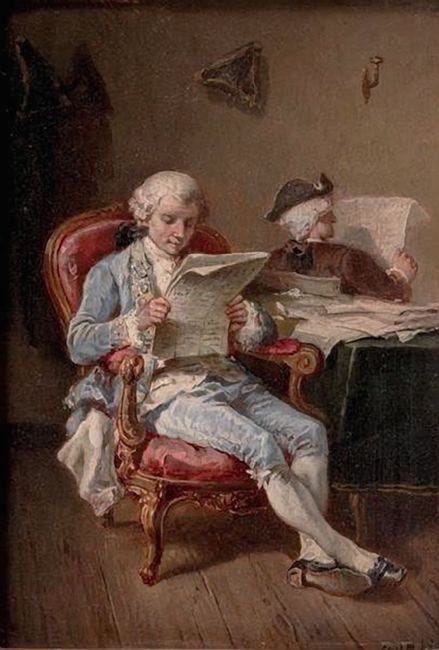Bad news: you are a young man in pre-Revolutionary France, and you are intent on speaking truth to power - or, at least, to the people to whom that power usually lies.
Good news: you have a bit of money. You also live outside France proper. You see, your great-grandparents were Huguenots (French Protestants) who fled France to evade the persecutions of the so-called Sun King. Good thing they’ve managed to land on their feet, otherwise you wouldn’t have the cash for the printing press right now.
Your location means you can live without fear of the censor - or the Bastille - whatever you write. However, what exactly are you going to write? Now, that’s a question. The French public is hungry for well-informed articles on political matters, both at home and abroad. These people are heartily sick of court gazettes writing about that time the Royal family had gone to Mass (again).
How are you going to get the news in question?
Option one: bribe some low-ranking secretary at a foreign embassy (or, better yet, a few). These guys are paid peanuts, they would gladly tell you what they know… though, how reliable that would be is another question. Disgruntled army officers can also work.
Option two: maintain a paid correspondent in Paris (or Brussels, or Vienna, or Saint-Petersburg… or all of these, if you have the budget for it!). That would be more expensive, but not as expensive as you might think - you won’t be their only source of income, so they won’t expect you to pay them a proper full salary. You can economize, too: tell your Hamburg correspondent to gather news from all the Baltic states, for instance. In exchange, these people would send you regular digests with the top local news, which you would then have to turn into editorial gold.
Option three: go all the way to the top. It’s been known for the King of Poland, John Adams, and Thomas Jefferson alike to supply newspapers with exclusive information. However, for that, you’d already have to have some standing, and besides… you don’t really think any of these people would be an impartial source, do you?
Now, your news gathered and your articles written (no fancy headlines, mind you - you’d have to live for more than half a century longer to see those), how do you put them together? You can’t do it yourself. You’ll need six or even eight people working together to set the type and print your issue. They’d expect decent treatment from you too - one or two days off straight after the new issue had been printed, good wages, and retirement pay. By the standards of the century, it was one of the better industries to be working in.
How do you get your ready copies into the hands of the subscribers? And you need a lot of subscribers, mind you - the golden age of advertising has not yet arrived, so you are unlikely to get more than 3% of your income from ads.
To take the copies to the border, you can use your country’s regular postal service (maybe negotiate a proper contract with them, while you can - you are going to be using them a lot, after all). After that, dedicated agents and distributors in France would take over (though, of course, you’d need to agree with them beforehand too). Actually, there is this bookseller in the capital by the name of David (probably no relation to the future revolutionary painter… probably). His Bureau general des gazettes etrangeres sells the papers in Paris both by subscription and through street vendors, and even ships the copies bound for the French provinces. He even issues regular prospectuses listing all the newspapers he handles, their prices, and the days on which they arrive. Just because your kind of journalism is illicit, it doesn’t mean it’s shoddily organized!
Now, your first issue out, you can relax… for three days, because after that, your readers would be expecting the next one. Good luck!
What if you hadn’t had the good fortune of living beyond the grasp of the Crown, though? What if you were actually born in the very heart of the realm, in the capital? Well… in that case, your choice would be either illicit pamphlets or handwritten periodicals - both of which I will explore in the next article…




